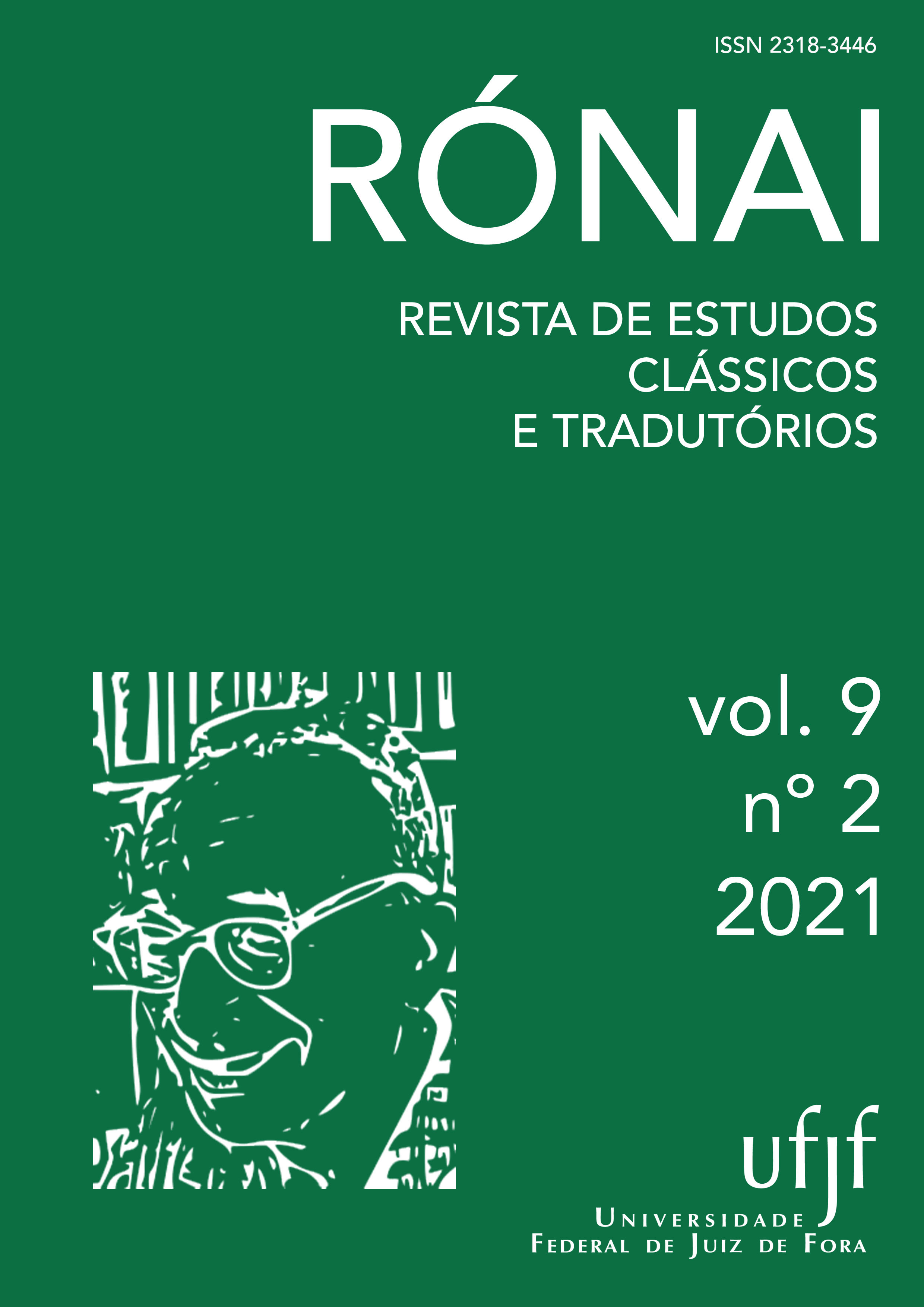Ulysses proficiens. A reassessment of Seneca’s reading
DOI:
https://doi.org/10.34019/2318-3446.2021.v9.35820Keywords:
Seneca, Ulysses, Stoicism, VirtueAbstract
This article offers a new reading of Seneca’s Ulysses. He will be proven not to stand for the Stoic hero, the symbol of virtue; rather, he will turn out to represent the proficiens – those who make any effort to reach virtue, and yet sometimes fail. In this regard, Ulysses is like Seneca himself, in as much as both of them appear to do their best to face the impetuous waves of fortune.
Downloads
References
ASMIS, E. Seneca’s originality. In: BARTSCH, S.; SCHIESARO, A. (eds.). The Cambridge Companion to Seneca. Cambridge: Cambridge University Press, 2015. p. 224-238.
BENATOUÏL, T. Le débat entre stoïcisme et platonisme à propos de la vie scolastique: Chrysippe, l'Ancienne Académie, Antiochus. In: BONAZZI, M.; HELMIG, C. Platonic Stoicism-Stoic Platonism. The Dialogue between Platonism and Stoicism in Antiquity. Leuven: Leuven University Press, 2007. p. 1-21.
BENATOUÏL, T. Theôria and scholê in Epictetus and Marcus Aurelius: Platonic, Stoic or Socratic?. In: LONG, A. G. (ed.). Plato and the Stoics. Cambridge: Cambridge University Press, 2007. p. 147-173.
BENATOUÏL, T. Θεωρία et vie contemplative du stoïcisme au platonisme. Chrysippe, Panétius, Antiochus et Alcinoos”, In: BONAZZI, M.; OPSOMER, J. The Origins of the Platonic System. Platonisms of the Early Empire and their Philosophical Contexts. Louvain-Namur-Paris-Walpole: Peeters, 2009. p. 3-31.
BERNO, F. Il cavallo saggio e lo stolto Enea. Due citazioni virgiliane nelle Epistulae ad Lucilium di Seneca (56, 12-14; 95, 68-71). Acta Classica, v. 49, p. 55-78, 2006.
BERNO, F. Ulisse ed Ercole Victores omnium terrorum? Nota testuale a Sen. const. 2, 1. Rheinisches Museum, v. 159, p. 409-415, 2016.
BONAZZI, M. Antioco di Ascalona su Ulisse e il desiderio umano di conoscenza (a proposito di Cicerone, De finibus bonorum et malorum, V 48-50). In: CATTANEI, E.; NATALI, C. Studi sul medioplatonismo e il neoplatonismo. Roma: Edizioni di Storia e Letteratura, 2019. p. 1-14.
BUFFIÈRE, F. Les mythes d'Homère et la pensée grecque. Paris: Les Belles Lettres, 1956.
CAMBIANO, G. Seneca e le contraddizioni del sapiens. In: GARBARINO, G.; LANA, I. (eds.). Incontri con Seneca. Atti della giornata di studio Torino, 26 ottobre 1999. Bologna: Pàtron, 2001. p. 49-60.
CHAUMARTINE, F. R. Philosophical tragedy?. In: DAMSCHEN, G.; HEIL, A. (eds.). Brill’s Companion to Seneca. Leiden-Boston: Brill, 2014. p. 653-672.
CLASSEN, C. J. Le virtù nelle lettere di Seneca a Lucilio. In: PARRONI, P. Seneca e il suo tempo. Salerno: Salerno Editrice, 2000. p. 275-294.
DELLE DONNE, C. Ulysses philosophus: a plausible reading?, Aevum Antiquum, v. 21, (forthcoming)
GIGANTE LANZARA, V. Il segreto delle sirene. Napoli: Bibliopolis, 2007.
HICKS, R. D. (ed.). Diogenes Laertius. Lives of eminent philosophers. Volume 2. Cambridge: HUP, 1925.
LÉVY, C. Les philosophies hellénistiques. Paris: Librairie Génerale Française, 1997.
LONG, A. A. La filosofia ellenistica: stoici, epicurei e scettici. Bologna: Il Mulino, 1989.
LONG, A. A.; SEDLEY, D. N. (eds.). The Hellenistic Philosophers. Cambridge: Cambridge University Press, v. 1, 1987.
MONTIGLIO, S. Wandering philosophers in classical Greece. The Journal of Hellenic Studies, v. 120, p. 86-105, 2000.
MOTTO, A. L.; CLARK, M. Essays on Seneca. Frankfurt-New York: Peter Lang, 1993.
PARENTE, M. I. Introduzione a lo Stoicismo ellenistico. Roma-Bari: Laterza, 1993.
PERUTELLI, A. Ulisse nella cultura romana. Firenze: Le Monnier Università, 2006.
PIERINI, R. D. I. Cicerone in Seneca: alcune riflessioni su un tema sempre attuale. Ciceroniana on line, v. 2, n. 1, p. 13-38, 2018.
RUSSELL, D. Virtue as Likeness to God in Plato and Seneca. Journal of the History of Philosophy, v. 42, n. 3, p. 241-260, 2004.
SENECA. Selected Philosophical Letters. Translated with introduction and commentary by B. Inwood. Oxford: Clarendon Press, 2007.
SENECA. De constantia sapientis - La fermezza del saggio. Intr., trad. e comm. di F. R. Berno. Napoli: Paolo Loffredo Iniziative Editoriali, 2018.
SENECA. Moral Essays. English translation by J. W. Basore. London-New York: W. Heinemann-G.P. Putnam’s sons, v. 1, 1928.
SENECA. Selected Letters. New translation by E. Fantham. Oxford: Oxford University Press, 2010.
TORRE, C. A margine del mito di Ulisse in Seneca prosatore. In: SETAIOLI, A. Apis Matina. Studi in onore di Carlo Santini. Trieste: Edizioni Università di Trieste, 2016. p. 704-714.
TRAINA, A. Lo stile drammatico del filosofo Seneca. Bologna: Pàtron, 1987.
TSOUNI, G. Antiochus on contemplation and the happy life. In: SEDLEY, D. N. (ed.). The philosophy of Antiochus. Cambridge: Cambridge University Press, 2012. p. 131-150.
WILDBERGER, J. Wisdom and Virtue. In: DAMSCHEN, G; HEIL, A. Brill’s Companion to Seneca. Leiden-Boston: Brill, 2014. p. 301-322.
Downloads
Published
How to Cite
Issue
Section
License
Copyright (c) 2021 Carlo G. Delle Donne

This work is licensed under a Creative Commons Attribution 4.0 International License.
Copyright
The authors of the published contributions agree with the following items:
1. The authors keep the copyright and convey to the journal the right of first publication, the work being licensed under a Creative Commons Attribution License 4.0 International.
2. The authors are allowed and stimulated to publicize and distribute their work online after the publication in the journal, recognizing first publication in this journal.
3. The authors of the approved works authorize the journal to distribute their content, after publication, for reproduction in content indexes, virtual libraries and similars.
For more information about Creative Commons Attribution License 4.0 International, please, go to: https://creativecommons.org/licenses/by/4.0/deed.en
Editorial exemption
The authors of the published contributions are entirely and exclusively responsible for their contents. Its content does not represent an official position of Rónai - Revista de Estudos Clássicos e Tradutórios neither of Faculdade de Letras da Universidade Federal de Juiz de Fora or their partner institutions.



